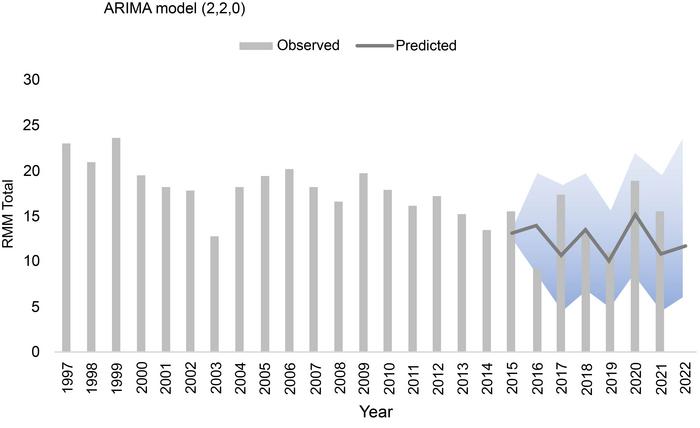During the peak of the SARS-CoV-2 pandemic, there was an increase in maternal mortality in Chile. This is confirmed by a natural population experiment based on data from the Department of Health Statistics and Information (DEIS) of the Chilean Ministry of Health. The research was published in PLOS Global Public Health.

Credit: MELISA Institute
During the peak of the SARS-CoV-2 pandemic, there was an increase in maternal mortality in Chile. This is confirmed by a natural population experiment based on data from the Department of Health Statistics and Information (DEIS) of the Chilean Ministry of Health. The research was published in PLOS Global Public Health.
In a collaborative study, led by Professor Elard Koch, senior epidemiologist and founder of MELISA Institute (Chile), and conducted with a team of researchers from the Universidad Católica Sedes Sapientiae (Peru), the Pontificia Universidad Católica Argentina and the Universidad Nacional de Buenos Aires (Argentina) and the Universidad de Chile (Chile), assessed the impact of the SARS-CoV-2 pandemic on maternal mortalityby specific causes during its hardest stage in Chile. For this, time series that exploit information from long-term annual trends were used, along with ARIMA models to predict expected mortality under the hypothesis that previous mortality trends would continue in the absence of the pandemic virus-related mortality burden. Epidemiologist Yordanis Enriquez Canto explains that maternal mortality trends were analyzed over time, comparing data from before and during the pandemic, through a natural experiment in which the effects of an event are observed without experimental manipulation.
This study revealed a significant impact of the COVID-19 pandemic on maternal mortality in Chile. Interestingly, the pandemic did not affect direct obstetric deaths such as hemorrhage, sepsis and abortion, but rather non-respiratory indirect obstetric causes increased the most. Prof. Elard Koch observes that this is an important finding, as it confirms that the pathophysiology of this emerging virus, even though it is a respiratory coronavirus, seriously affected other systems and organs, possibly linked to comorbidities such as diabetes, hypertension, and other or pre-existing chronic conditions. Likewise, the epidemiologist affirms that this finding differentiates it from the effect of other pandemics such as the 2009 H1N1 influenza, which caused a transient increase only in maternal deaths from sepsis and respiratory disease, as demonstrated in another natural experiment from Argentina published by Koch’s research team elsewhere. (Critto et al Lancet Reg Health Am. 2021 doi: 10.1016/j.lana.2021.100116)
The results of this natural experiment highlight the urgent need to strengthen the registration and surveillance system for pregnant women. Sociologist María Elena Critto highlights that the information obtained in this research is key so that, in the face of pandemic viruses, public policies can offer a rapid, comprehensive and effective response. She emphasizes that the data collected are extremely valuable for mitigating the adverse effects of these viruses on maternal mortality, both in Chile and in other countries in Latin America.
According to Dr. Aliro Galleguillos OB/Gyn and public health specialist from the Universidad de Chile, emphasizes that well-designed epidemiological studies during natural pandemic events are a substantial contribution to the knowledge of the natural history of emerging diseases and also allow to evaluate whether limited resources meet the true health needs of pregnant women. In this sense, the relevance of this scientific study lies in its fundamental role in monitoring the performance of public policies and serving as a basis for promoting evidence-based policies in future pandemic events.
###
This study was supported by research grants EPI-092018-01 and ONE-052021-01, both granted by FISAR http://www.fisarchile.org/.
Researchers participating:
Yordanis Enriquez, Faculty of Health Sciences, Universidad Católica Sedes Sapientiae, Lima, Perú; María Elena Critto, Faculty of Medical Sciences, Pontificia Universidad Católica, Buenos Aires, Argentina; Ruth Weinberg, Faculty of Medicine, National University of Buenos Aires, Buenos Aires, Argentina; Lenin de Janon Quevedo, Faculty of Medical Sciences, Pontificia Universidad Católica, Buenos Aires, Argentina; Aliro Galleguillos, Faculty of Medicine, Universidad de Chile, Santiago de Chile, Chile; Elard Koch, MELISA Institute, Concepcion, Chile.
Journal
PLOS Global Public Health
DOI
10.1371/journal.pgph.0002882
Method of Research
Observational study
Subject of Research
People
Article Title
Effects of emerging SARS-CoV-2 on total and cause-specific maternal mortality: A natural experiment in Chile during the peak of the outbreak, 2020–2021
Article Publication Date
11-Jul-2024
COI Statement
Competing interests: The authors have declared that no competing interests exist.




